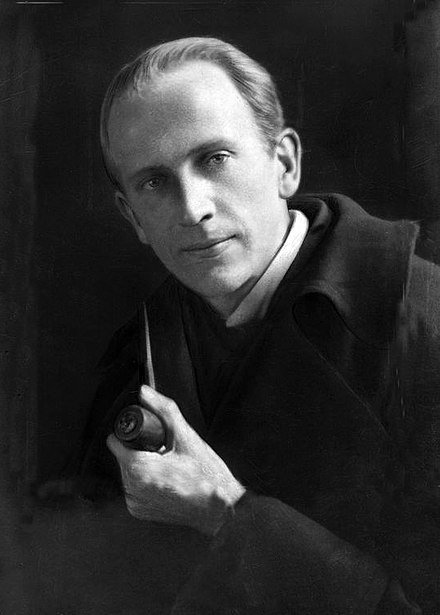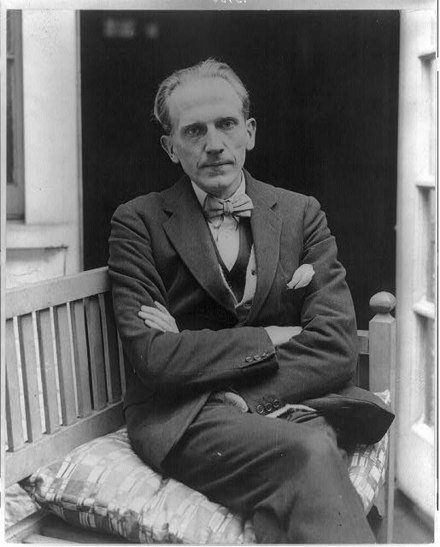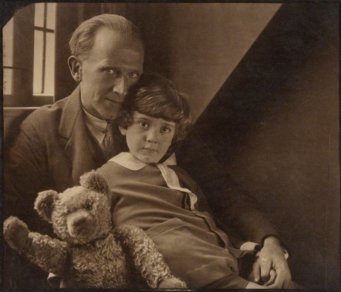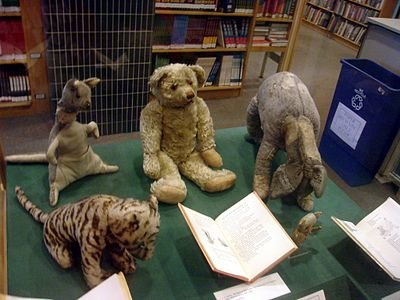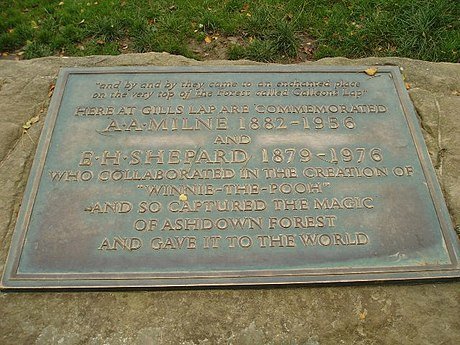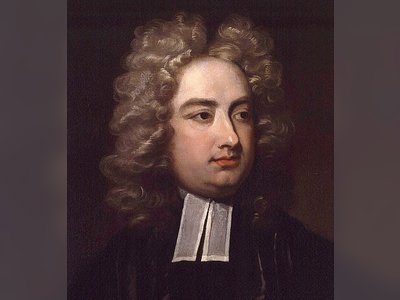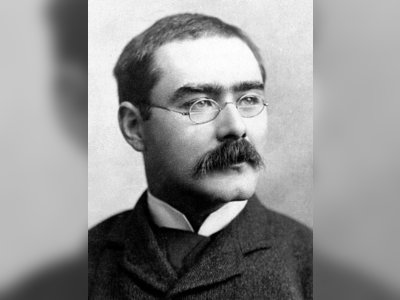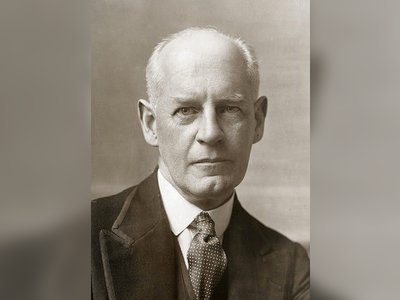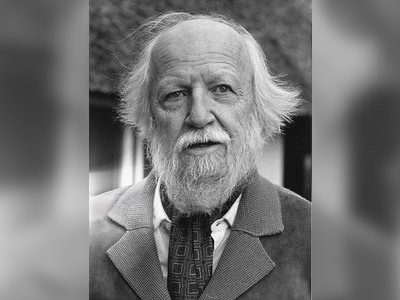British Heritage
Remember, Cherish, Learn.
beta
A. A. Milne
Contribution of A. A. Milne to British Heritage.
Alan Alexander Milne, known as A. A. Milne, holds a significant place in British literary heritage due to his timeless creations, particularly the beloved character Winnie-the-Pooh. His works have captured the hearts of readers worldwide and have become an integral part of British childhood and culture. Milne's contributions to British heritage can be attributed to several aspects: his literary legacy, the success of his characters and stories, his involvement in World Wars, and the enduring impact of Winnie-the-Pooh on popular culture.
Born on January 18, 1882, in Kilburn, London, A. A. Milne was raised in a literary environment, with his father running a small independent school where H. G. Wells taught. Milne's education at Westminster School and Trinity College, Cambridge, further cultivated his intellectual growth. Initially recognized for his humor writing, Milne's talent extended to various genres, including plays and novels.
Milne's life took a significant turn when he joined the British Army during World War I, serving as an officer in the Royal Warwickshire Regiment and the Royal Corps of Signals. After sustaining injuries in the Battle of the Somme, he was recruited into Military Intelligence to write propaganda articles. Despite his service, Milne later denounced war in his work "Peace with Honour" and expressed regrets over the impact of fame on his son, Christopher Robin.
Before his iconic success with Winnie-the-Pooh, Milne had already established himself as a talented writer with 18 plays and three novels, including "The Red House Mystery." However, his true literary legacy emerged with the creation of the lovable bear, Winnie-the-Pooh. Inspired by his son's stuffed toys and the real-life bear, Winnie, from the London Zoo, Milne crafted endearing characters such as Piglet, Eeyore, Kanga, Roo, Tigger, Rabbit, and Owl, who inhabited the fictional Hundred Acre Wood.
The first appearance of Winnie-the-Pooh was in a poem titled "Teddy Bear" in Punch magazine in 1924. This was followed by the stories "The Wrong Sort of Bees" in the London Evening News on Christmas Eve, 1925. The success of the Pooh stories was unprecedented, and Milne's books, including "Winnie-the-Pooh" (1926) and "The House at Pooh Corner" (1928), captured the imagination of children and adults alike. The charming illustrations by E. H. Shepard added to the appeal of these tales.
Winnie-the-Pooh's enchanting adventures and the imaginative world of the Hundred Acre Wood have left an indelible mark on popular culture. The characters' whimsical charm and timeless wisdom have transcended generations, making them enduring symbols of innocence and friendship. Winnie-the-Pooh became a central figure in children's literature, and his stories were translated into numerous languages, introducing him to a global audience.
The success of Winnie-the-Pooh extended beyond literature into various forms of media and merchandise. The character's popularity gave rise to numerous cartoons, television shows, and movies, with the Walt Disney Company playing a significant role in bringing the tales to life on screen. Winnie-the-Pooh-themed products and merchandise have become beloved items for children and collectors worldwide.
A. A. Milne's legacy is not limited to his literary contributions; it also encompasses his role as a father and the impact of his work on his son, Christopher Robin Milne. While the world adored Winnie-the-Pooh, Christopher Robin Milne experienced mixed feelings about the character's fame, leading to some estrangement from his parents.
Despite the challenges, the timeless charm of Winnie-the-Pooh endured, and the character's 90th anniversary in 2016 was celebrated with new stories and cultural events, further solidifying its place in British heritage. The character's representation of kindness, friendship, and childhood innocence continues to resonate with audiences of all ages.
A. A. Milne's contributions to British heritage go beyond the literary realm. The impact of his creations has extended into the realm of education, tourism, and the commemoration of his work. The setting of the Pooh stories, the Five Hundred Acre Wood in Ashdown Forest, East Sussex, has become a popular tourist destination, attracting visitors from around the world to explore the enchanted world of Winnie-the-Pooh. The stories' themes of friendship, imagination, and the joy of simple pleasures have become cultural touchstones, and the characters remain beloved figures in British heritage.
As A. A. Milne once wrote, "In that enchanted place on the top of the forest, a little boy and his bear will always be playing." And so, the legacy of Winnie-the-Pooh lives on, delighting readers and enchanting hearts for generations to come.
Early Life and Military Career
Born on January 18, 1882, in Kilburn, London, A. A. Milne was raised in a literary environment, with his father running a small independent school where H. G. Wells taught. Milne's education at Westminster School and Trinity College, Cambridge, further cultivated his intellectual growth. Initially recognized for his humor writing, Milne's talent extended to various genres, including plays and novels.
Milne's life took a significant turn when he joined the British Army during World War I, serving as an officer in the Royal Warwickshire Regiment and the Royal Corps of Signals. After sustaining injuries in the Battle of the Somme, he was recruited into Military Intelligence to write propaganda articles. Despite his service, Milne later denounced war in his work "Peace with Honour" and expressed regrets over the impact of fame on his son, Christopher Robin.
Literary Legacy and Success of Winnie-the-Pooh
Before his iconic success with Winnie-the-Pooh, Milne had already established himself as a talented writer with 18 plays and three novels, including "The Red House Mystery." However, his true literary legacy emerged with the creation of the lovable bear, Winnie-the-Pooh. Inspired by his son's stuffed toys and the real-life bear, Winnie, from the London Zoo, Milne crafted endearing characters such as Piglet, Eeyore, Kanga, Roo, Tigger, Rabbit, and Owl, who inhabited the fictional Hundred Acre Wood.
The first appearance of Winnie-the-Pooh was in a poem titled "Teddy Bear" in Punch magazine in 1924. This was followed by the stories "The Wrong Sort of Bees" in the London Evening News on Christmas Eve, 1925. The success of the Pooh stories was unprecedented, and Milne's books, including "Winnie-the-Pooh" (1926) and "The House at Pooh Corner" (1928), captured the imagination of children and adults alike. The charming illustrations by E. H. Shepard added to the appeal of these tales.
Impact on Popular Culture and Merchandising
Winnie-the-Pooh's enchanting adventures and the imaginative world of the Hundred Acre Wood have left an indelible mark on popular culture. The characters' whimsical charm and timeless wisdom have transcended generations, making them enduring symbols of innocence and friendship. Winnie-the-Pooh became a central figure in children's literature, and his stories were translated into numerous languages, introducing him to a global audience.
The success of Winnie-the-Pooh extended beyond literature into various forms of media and merchandise. The character's popularity gave rise to numerous cartoons, television shows, and movies, with the Walt Disney Company playing a significant role in bringing the tales to life on screen. Winnie-the-Pooh-themed products and merchandise have become beloved items for children and collectors worldwide.
Legacy and Cultural Recognition
A. A. Milne's legacy is not limited to his literary contributions; it also encompasses his role as a father and the impact of his work on his son, Christopher Robin Milne. While the world adored Winnie-the-Pooh, Christopher Robin Milne experienced mixed feelings about the character's fame, leading to some estrangement from his parents.
Despite the challenges, the timeless charm of Winnie-the-Pooh endured, and the character's 90th anniversary in 2016 was celebrated with new stories and cultural events, further solidifying its place in British heritage. The character's representation of kindness, friendship, and childhood innocence continues to resonate with audiences of all ages.
A. A. Milne's contributions to British heritage go beyond the literary realm. The impact of his creations has extended into the realm of education, tourism, and the commemoration of his work. The setting of the Pooh stories, the Five Hundred Acre Wood in Ashdown Forest, East Sussex, has become a popular tourist destination, attracting visitors from around the world to explore the enchanted world of Winnie-the-Pooh. The stories' themes of friendship, imagination, and the joy of simple pleasures have become cultural touchstones, and the characters remain beloved figures in British heritage.
As A. A. Milne once wrote, "In that enchanted place on the top of the forest, a little boy and his bear will always be playing." And so, the legacy of Winnie-the-Pooh lives on, delighting readers and enchanting hearts for generations to come.
- A. A. Milneen.wikipedia.org
